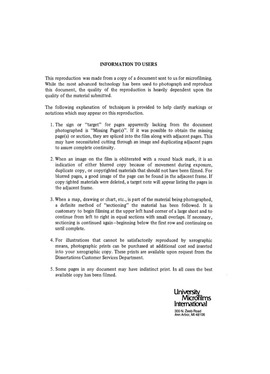| dc.contributor.author | Ilo, Raphael Esione, | en_US |
| dc.date.accessioned | 2013-08-16T12:28:50Z | |
| dc.date.available | 2013-08-16T12:28:50Z | |
| dc.date.issued | 1982 | en_US |
| dc.identifier.uri | https://hdl.handle.net/11244/5089 | |
| dc.description.abstract | Comparison of the costs of producing some Nigerian agricultural crops by using sewage sludge and commercial fertilizer showed that sewage sludge is 14 and 33 times less expensive than commercial fertilizer using sludge produced at 50% and 70% population sewage respectively. The application of sludge in tons/acre as compared to lbs/acre of commercial fertilizer does not shift the economic advantage in favor of commercial fertilizer. Comparison of the residual effects of growing the same crops for four consecutive years showed that both the sludge application rates and the costs/acre decreased progressively each year and levelled off after the fourth year, while the costs and application rates/acre of commercial fertilizer remained constant. This demonstrates that commercial fertilizer has no residual effects. | en_US |
| dc.description.abstract | The application of human waste on agricultural land has an ancient history. Its origin dates back several centuries in China. This study was concerned with the use of liquid digested sewage sludge as a fertilizer instead of commercial fertilizer to grow some Nigerian agricultural crops. Attempts were made to obtain from Nigeria the necessary data; unfortunately, some of the data were not available. Therefore, relevant data from other developing tropical countries and the United States were used. The annual quantities of sewage sludge produced by trickling filter treatment plant were estimated for various percentages of population sewerages. After determining the annual sewage sludge application rates for desired crop yields for some Nigerian crops, the annual costs of commercial fertilizer and sewage sludge were calculated. | en_US |
| dc.description.abstract | Consideration of the annual saving that could be made by using sewage sludge instead of commercial fertilizer showed that depending on specific crops produced, substantial amounts of money could be saved. The problems associated with application of sewage sludge on agricultural lands will not be experienced by Nigerian municipalities if the program is adequately planned, and the control measures recommended by this study adopted. Based on the results, it was recommended that sewage sludge can be cheaply used to produce the same desired crop yields as commercial fertilizer and to minimize Nigerian foreign exchange used in commercial fertilizer importation. | en_US |
| dc.format.extent | x, 275 leaves : | en_US |
| dc.subject | Engineering, Agricultural. | en_US |
| dc.title | Land application of sewage sludge in agricultural land in Nigeria with special reference to Enugu. | en_US |
| dc.type | Thesis | en_US |
| dc.thesis.degree | Ph.D. | en_US |
| dc.thesis.degreeDiscipline | School of Civil Engineering and Environmental Science | en_US |
| dc.note | Source: Dissertation Abstracts International, Volume: 43-11, Section: B, page: 3665. | en_US |
| ou.identifier | (UMI)AAI8306743 | en_US |
| ou.group | College of Engineering::School of Civil Engineering and Environmental Science | |
